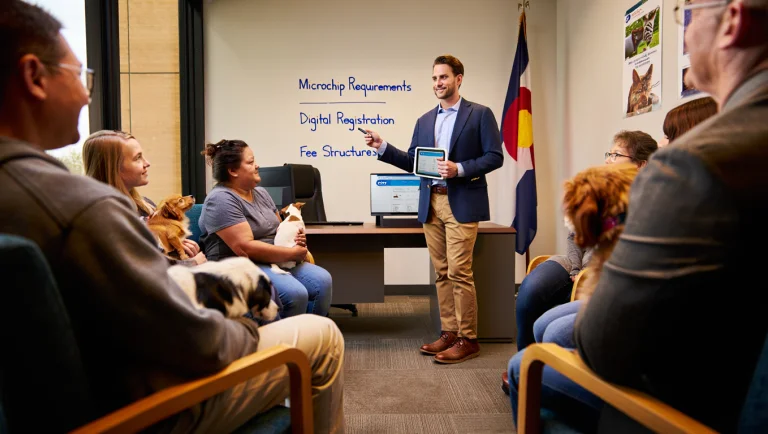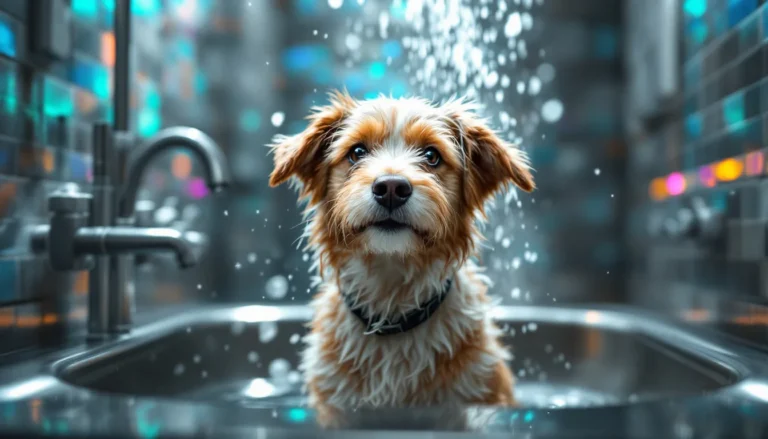Learn about the Colorado pet registration bill’s 7 key updates affecting all pet owners, including digital registration, microchipping requirements, and new fee structures.
Table of Contents
The Colorado Pet Registration Bill has recently undergone significant changes, affecting pet owners across the state. These updates aim to improve animal welfare, reduce the number of stray pets, and create a more organized system for pet ownership in Colorado. Whether you’re a long-time pet owner or considering adopting your first furry friend, understanding these new regulations is essential for responsible pet ownership. This comprehensive guide breaks down the seven key updates to the Colorado pet registration bill that every pet owner needs to know in 2025.

What Is the Colorado Pet Registration Bill?
Before diving into the updates, it’s important to understand what the Colorado Pet Registration Bill entails. Established to create a statewide database of pets, this legislation requires Colorado residents to register their dogs, cats, and in some cases, other domestic animals with local authorities. The bill was initially designed to help reunite lost pets with their owners, reduce shelter overcrowding, and ensure pets receive proper vaccinations and care.
The recent amendments to the bill have expanded its scope and introduced new requirements that pet owners must follow to remain compliant with state law.
The 7 Key Updates to the Colorado Pet Registration Bill
1. Digital Registration System Implementation
One of the most significant changes to the Colorado pet registration bill is the transition to a fully digital registration system. Previously, pet owners had to register their animals in person at designated facilities, which often resulted in long wait times and administrative inefficiencies.
How the Digital System Works
The new digital platform allows pet owners to:
- Register new pets online through a secure portal
- Update pet information in real-time
- Upload vaccination records directly to the system
- Pay registration fees electronically
- Receive digital certificates and reminders about renewals
According to the Colorado Department of Agriculture, this digital transition is expected to increase registration compliance by approximately 35% in the first year alone. The streamlined process takes an average of just 7 minutes to complete, compared to the previous average of 45 minutes for in-person registration.
This update reflects Colorado’s commitment to modernizing government services while making pet registration more accessible for all residents.
2. Tiered Fee Structure Based on Spay/Neuter Status
The revised Colorado pet registration bill introduces a tiered fee structure that incentivizes responsible pet ownership through spaying and neutering.
New Fee Structure
| Pet Status | Previous Fee | New Fee | Annual Renewal |
| Spayed/Neutered | $25 | $15 | $10 |
| Intact (not altered) | $25 | $50 | $40 |
| Service Animals | $25 | $0 | $0 |
| Seniors (pets over 8 years) | $25 | $10 | $5 |
This significant price difference aims to encourage more pet owners to spay or neuter their animals, which helps control the pet population and reduces the burden on animal shelters. According to statistics from Denver Animal Protection, areas with similar tiered pricing have seen a 28% increase in spay/neuter procedures within the first year of implementation.
Additionally, the bill now provides fee waivers for low-income families who may struggle with the registration costs but still want to comply with the law and responsibly care for their pets.

3. Mandatory Microchipping Requirement
Perhaps the most controversial update to the Colorado pet registration bill is the new mandatory microchipping requirement. As of July 2025, all registered pets must have a microchip implanted by a licensed veterinarian.
Benefits of Mandatory Microchipping
- Permanent identification that cannot be lost, removed, or damaged
- Increased chances of reuniting lost pets with their owners
- Reduced burden on animal shelters and rescue organizations
- Deterrence against pet theft
- Lifetime identification linked to the state database
The Colorado Veterinary Medical Association reports that microchipped pets are up to 20 times more likely to be returned to their owners when lost compared to non-microchipped pets. The state has partnered with several veterinary clinics to offer reduced-cost microchipping services, with prices starting at $15 compared to the standard $45-$65 range.
Pet owners have a six-month grace period to comply with this requirement once the regulation takes effect. After this period, failure to microchip a registered pet may result in additional fees during the renewal process.
4. Extended Registration Coverage for Exotic Pets
The updated Colorado pet registration bill now extends beyond cats and dogs to include certain exotic pets. This expansion aims to better monitor potentially dangerous or invasive species and ensure they are kept in appropriate conditions.
Exotic Pets Now Requiring Registration
- Reptiles over 5 feet in length
- Venomous reptiles of any size
- Large birds of prey
- Non-native primates
- Ferrets and similar mustelids
- Large rodents (capybaras, etc.)
- Any CITES-listed exotic species
Registration for exotic pets includes additional requirements such as proof of appropriate housing, specialized care knowledge, and in some cases, specific permits. This broader coverage represents Colorado’s commitment to responsible exotic pet ownership and environmental protection.
According to data from the Colorado Parks and Wildlife Department, unregistered exotic pets account for approximately 150 animal control incidents annually, with costs exceeding $275,000 for capture, housing, and relocation efforts.
5. Integration with Veterinary Health Records
The fifth update to the Colorado pet registration bill establishes an innovative integration between the state registration database and veterinary health records. With owner permission, veterinarians can now access and update pet information directly in the state system.
Benefits of Veterinary Integration
- Automatic updates to vaccination records
- Streamlined verification of registration status during vet visits
- Easier tracking of health issues across multiple veterinary providers
- Improved emergency response in case of disasters or evacuations
- Better monitoring of potential disease outbreaks
This integration has been praised by the Colorado Veterinary Medical Association as a significant step forward in pet healthcare management. Dr. Maria Sanchez, President of the CVMA, stated, “This system allows veterinarians to provide better continuity of care while helping pet owners stay compliant with registration requirements.”
The system employs strong data protection measures to ensure pet and owner information remains secure while still allowing necessary access to authorized medical providers.
6. Enhanced Enforcement and Compliance Measures
The sixth key update involves strengthened enforcement mechanisms to ensure better compliance with the registration requirements. Previously, enforcement was inconsistent across different counties and municipalities.
New Enforcement Provisions
- Standardized penalties across all Colorado counties
- Regular compliance checks during routine veterinary visits
- Integration with animal control systems statewide
- Community-based registration events in underserved areas
- Progressive penalty structure for repeat non-compliance
First-time violators will receive a warning and a 30-day grace period to register their pets. Second violations incur a $50 fine, while subsequent violations can result in fines of up to $250. However, the bill emphasizes education over punishment, with at least 60% of collected fines directed toward public awareness campaigns and subsidized registration events.
Colorado counties with stronger enforcement mechanisms have reported registration compliance rates of up to 85%, compared to the previous statewide average of 59%. This demonstrates that consistent enforcement, coupled with accessible registration options, significantly improves overall compliance.
7. Community Benefit Programs
The final major update to the Colorado pet registration bill establishes several community benefit programs funded by registration fees. These programs aim to improve animal welfare throughout the state while providing valuable services to pet owners.
Key Community Programs
- Free spay/neuter clinics in underserved communities
- Emergency veterinary assistance fund for low-income pet owners
- Disaster response resources for pets during emergencies
- Community education initiatives about responsible pet ownership
- Support for rural animal control services
- Grant funding for shelter improvements
Approximately 30% of all collected registration fees will be allocated to these programs, representing an estimated $3.8 million in annual funding. This makes the Colorado pet registration program one of the most comprehensive in terms of reinvesting in animal welfare infrastructure.
The bill specifically prioritizes communities with limited access to veterinary care and animal services, aiming to reduce the geographic disparities in pet welfare across urban and rural parts of Colorado.

Impact on Colorado Pet Owners
The updated Colorado pet registration bill creates both new responsibilities and benefits for pet owners across the state. Understanding these impacts can help pet owners navigate the changes effectively.
Responsibilities for Pet Owners
- Register all qualifying pets through the new digital system
- Ensure pets are microchipped by the specified deadline
- Pay the appropriate registration fees based on pet status
- Keep registration information current and renewed annually
- Register exotic pets that fall under the new categories
Benefits for Pet Owners
- Easier process for recovering lost pets
- Access to subsidized veterinary services through community programs
- Reduced fees for responsible pet ownership practices
- Better coordination during emergencies and natural disasters
- Improved data for pet-friendly community planning
According to surveys conducted by the Colorado Pet Owners Association, 68% of pet owners support the updated registration requirements once they understand the community benefits and improved services that result from the program.
Preparing for Compliance
With these significant changes to the Colorado pet registration bill, pet owners should take proactive steps to ensure compliance and avoid potential penalties.
Compliance Checklist
- Verify Current Registration Status: Check if your pet’s current registration is still valid and when it expires.
- Schedule Microchipping: If your pet isn’t already microchipped, schedule this procedure with your veterinarian.
- Gather Required Documentation: Collect vaccination records, proof of spay/neuter status, and any other relevant medical records.
- Create an Account: Set up your profile on the new digital registration platform.
- Complete Registration: Register your pet(s) and pay the appropriate fees.
- Set Reminders: Note important dates for renewals and required updates.
- Update Information: Ensure all contact information remains current in case your pet is lost.
Many veterinary clinics across Colorado are offering “compliance packages” that include registration assistance, microchipping, and record digitization to help pet owners adjust to the new requirements.
Recommended Pet Products on Amazon
To help Colorado pet owners stay compliant with the new registration bill requirements, here are four recommended products that can make the process easier:
Pet Registration and ID Products
- ResQID Digital Pet Information Management System – A comprehensive tool that helps pet owners store and manage all their pet’s registration and medical information in one secure place.
- PetSafe Microchip Home Scanner – Allows pet owners to verify their pet’s microchip functionality and number from home before registration.
- TagWorks Custom Pet ID Tags – Customizable tags that can include registration numbers and contact information as a backup to microchipping.
- PetFinder GPS Pet Tracker – An additional safety measure that works alongside microchipping to help locate lost pets quickly.
Frequently Asked Questions
When do the new Colorado pet registration bill updates take effect?
The updates to the Colorado pet registration bill will be implemented in phases, with the digital registration system launching on May 1, 2025, and the mandatory microchipping requirement taking effect on July 15, 2025. The tiered fee structure is already in place, and the exotic pet registration expansion begins January 1, 2026.
What happens if I don’t register my pet?
Non-compliance with the registration requirements can result in progressive penalties. First-time violators receive a warning with a 30-day compliance window. Subsequent violations can result in fines ranging from $50 to $250. Additionally, unregistered pets may not be eligible for certain community services funded by the registration program.
Are there exemptions for certain pets or situations?
Yes, the bill includes exemptions for:
- Service animals (though registration is still required, fees are waived)
- Pets with medical conditions that make microchipping unsafe (requires veterinary documentation)
- Temporary residents staying less than 90 days in Colorado
- Animals in recognized animal rescues (temporary exemption pending adoption)
- Livestock animals used for agricultural purposes
How do I update my pet’s information if I move within Colorado?
The new digital system allows you to update your address and contact information online through your account. Changes should be made within 30 days of relocating to ensure continuity of service and proper jurisdiction assignment.
Can I transfer my pet’s registration from another state?
While Colorado doesn’t automatically accept registrations from other states, the new system includes a streamlined process for recognizing out-of-state records. You’ll need to create a new registration but can import vaccination records and microchip information from previous registrations in other states.
What information is stored in the registration database?
The database contains:
- Pet identification (species, breed, color, markings, age)
- Microchip number and implant date
- Owner contact information
- Vaccination history (with owner permission)
- Spay/neuter status
- Licensing history
- Any special designations (service animal, emotional support animal, etc.)
How are the registration fees used?
Registration fees are allocated as follows:
- 40% for administrative costs and system maintenance
- 30% for community benefit programs
- 15% for animal control services
- 10% for education and outreach
- 5% for emergency response planning
Taking Action: Next Steps for Pet Owners
As these changes to the Colorado pet registration bill take effect, it’s important for pet owners to stay informed and take appropriate action. Here are some recommended next steps:
- Mark Important Dates: Note the implementation timeline for different aspects of the bill
- Budget for Fees: Plan for registration costs based on your pet’s status
- Talk to Your Veterinarian: Discuss microchipping if your pet doesn’t already have one
- Join Community Events: Participate in registration drives that often offer discounted services
- Stay Informed: Follow updates from Colorado’s Department of Agriculture for any changes
For expert recommendations and more pet care tips related to these new regulations, explore BlithePet where you’ll find comprehensive guides tailored to Colorado pet owners.
Conclusion: Embracing Responsible Pet Ownership in Colorado
The updates to the Colorado pet registration bill represent a significant step toward more responsible and organized pet ownership across the state. While these changes come with new responsibilities for pet owners, they also offer substantial benefits in terms of pet safety, community resources, and improved animal welfare infrastructure.
By understanding and complying with these new requirements, Colorado pet owners contribute to a system that benefits all pets and people in the state. The digital transformation, community programs, and enhanced services funded by registration fees create a more supportive environment for pets and their owners.
We encourage you to share your experience with the new registration process and how these changes have affected your pet care routines. Have you found the digital system easier to use? Has your community benefited from any of the new programs? Leave a comment and join the conversation about the future of pet ownership in Colorado.







